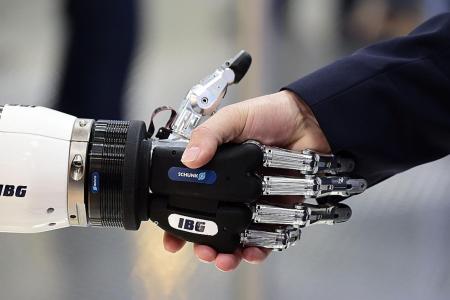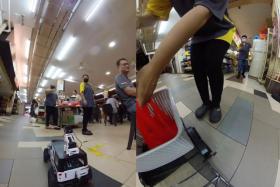Ongoing transformation of industries and work: Why it matters
Singapore can take advantage of the transformational effects of new technologies on supply chains and business models
Traditional supply chains in sourcing, manufacturing, distribution and logistics are being reshaped by macroeconomic trends and emerging technologies. Global trends in new markets and supply chain optimisation are causing manufacturing to reallocate resources and re-locate production and distribution sites.
In particular, the rise of new technologies has led to what is termed Industry 4.0, a confluence of technologies enabling digitalisation, data and dynamic response. Industry 4.0 has potentially transformational effects across industries.
Firstly, the structure of global supply chains is changing with changes in technology.
E-commerce is changing the nature of retail and distribution, while automation and 3D printing transform manufacturing processes and locations.
The rise of online and mobile shopping has led to mega warehouses, data-driven sales and forecasting, and extensive distribution networks. Malls are changing strategies to incorporate online to offline modes of customer interaction.
Adidas opened its first factory in the US last year, using robotics and other advanced manufacturing techniques to make shoes for the US market.
The use of automation helps it to do relatively cost-effective manufacturing, while enabling it to respond to market changes more quickly. It also formed a joint venture in Silicon Valley to utilise 3D printing for custom manufacturing of shoes and small production runs.
Secondly, digitalisation has led to new business models.
Venerable lockmaker Assa Abloy bought smart locks start-up August Home last year to expand into smarthome access solutions.
DIVERSIFY
Thirdly, industry lines are blurring as companies diversify their offerings and cross into adjacent and new markets.
When Amazon acquired fresh foods grocery chain Whole Foods in the US, the market capitalisation of listed grocery companies in the US fell by almost US$12 billion (S$16.5 billion) out of fears of competition from Amazon based on price cuts and efficiency honed through its e-commerce experience.
While these disruptive changes bring uncertainty to businesses, there are opportunities for resource-limited countries like Singapore.
Automation can equalise the playing field by reducing the need for low-cost labour while enabling key business activities to be conducted here.
New business models, products and services enable local companies to move up the value chain, against competitors with larger domestic markets.
Knowledge-based management and operations play to our strengths as a well-trained and educated workforce.
Singapore's position as a financial, logistics, and business hub coordinating various streams of activities regionally and globally could be further strengthened by positioning for Industry 4.0 and beyond.
The writer is an associate professor with the NUS School of Continuing and Lifelong Education. To check out NUS' latest continuing education and training initiative, visit scale.nus.edu.sg/Lifelong-Learning/Public/index.html
Get The New Paper on your phone with the free TNP app. Download from the Apple App Store or Google Play Store now



